By Leen Randell
Updated: Jul 10, 2024
10 Best Herbal Decoctions For Ankylosing Spondylitis
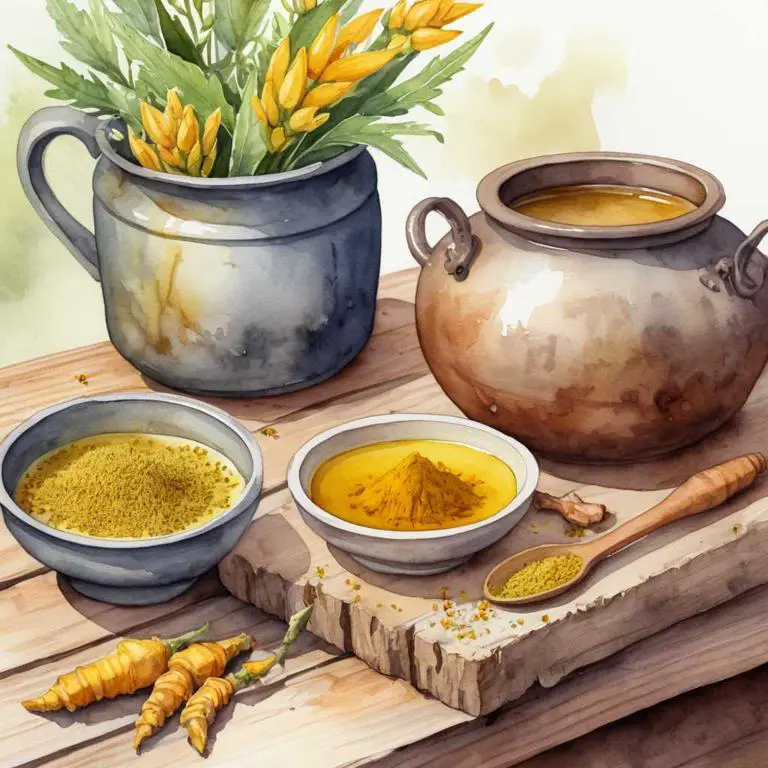
Herbal decoctions for ankylosing spondylitis are a natural remedy that involves steeping herbs in hot water to create a soothing tea-like liquid.
These decoctions can help alleviate the symptoms of ankylosing spondylitis, a chronic inflammatory disease that causes joint pain and stiffness, by reducing inflammation and promoting relaxation. For example, ginger, turmeric, and ashwagandha are commonly used herbal decoctions that have anti-inflammatory properties, which can help reduce joint pain and improve mobility.
By incorporating these decoctions into their daily routine, individuals with ankylosing spondylitis may experience improved sleep quality, reduced morning stiffness, and increased flexibility, allowing them to live more comfortably and confidently.
The following article describes in detail the most important decoctions for ankylosing spondylitis, including medicinal properties, parts of herbs to use, and recipes for preparations.
- 1. Curcuma longa
- 2. Zingiber officinale
- 3. Salix alba
- 4. Hypericum perforatum
- 5. Boswellia serrata
- 6. Harpagophytum procumbens
- 7. Withania somnifera
- 8. Cinnamomum verum
- 9. Echinacea angustifolia
- 10. Mentha x piperita
- What is the best combination of herbal decoctions to use for ankylosing spondylitis?
- What ailments similar to ankylosing spondylitis are treated with herbal decoctions?
1. Curcuma longa
Turmeric decoctions helps with ankylosing spondylitis because of its potent anti-inflammatory properties, which effectively reduce joint pain and stiffness.
The curcumin present in turmeric has been shown to inhibit the production of inflammatory molecules, thereby alleviating symptoms such as morning stiffness, reduced mobility, and limited range of motion. Additionally, turmeric's antioxidant properties help protect against tissue damage and promote joint health.
As a result, regular consumption of herbal turmeric decoctions can provide significant relief for individuals suffering from ankylosing spondylitis.
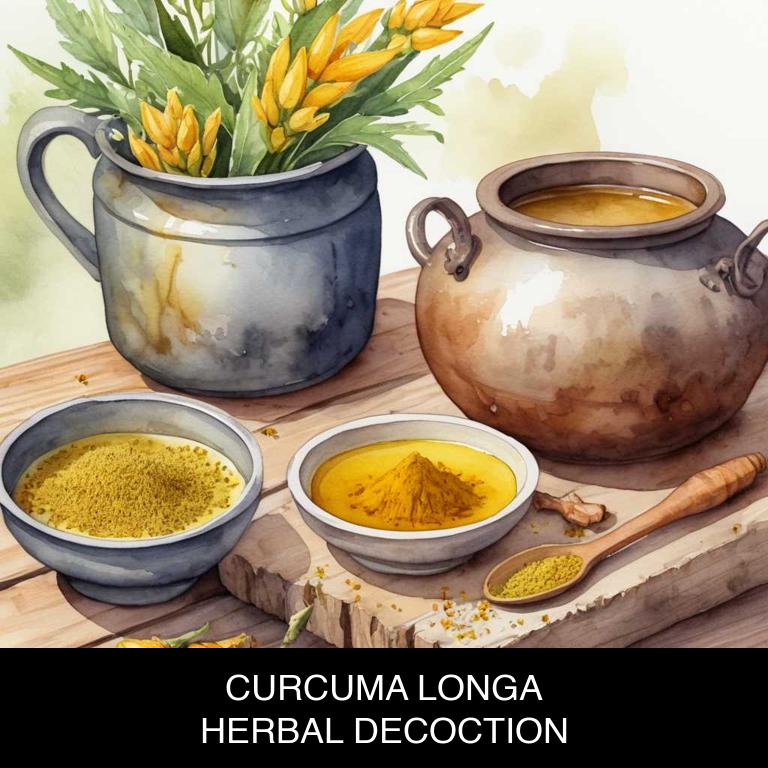
Medicinal Constituents
The list below shows the primary medicinal constituents in Curcuma longa decoctions that help with ankylosing spondylitis.
- Curcumin: It has potent anti-inflammatory and antioxidant properties, which help reduce inflammation and oxidative stress in the joints associated with ankylosing spondylitis.
- Demethoxycurcumin: It has strong anti-inflammatory and immunomodulatory effects, which help modulate the immune response and reduce inflammation in the joints and spine.
- Bisdemethoxycurcumin: It has anti-inflammatory and pro-apoptotic properties, which help reduce inflammation and induce the death of inflammatory cells, thus alleviating symptoms of ankylosing spondylitis.
Parts Used
The list below shows the primary parts of turmeric used to make decoctions for ankylosing spondylitis.
- Roots: The roots of Curcuma longa are used for their medicinal properties, including anti-inflammatory and antioxidant effects, which help alleviate symptoms of ankylosing spondylitis.
- Stems: The stems of Curcuma longa are also used, particularly for their anti-inflammatory and immunomodulatory properties, which aid in reducing joint inflammation and promoting overall well-being.
Quick Recipe
The following recipe gives a procedure to make a basic turmeric for ankylosing spondylitis.
- Crush 3-5g of dried curcuma longa roots into a fine powder using a mortar and pestle.
- Combine the powder with 1 liter of boiling water in a large saucepan.
- Reduce heat to a simmer and let the decoction steep for 5-10 minutes.
- Strain the liquid using a cheesecloth or a fine-mesh sieve into a clean container.
- Allow the decoction to cool completely before storing it in the refrigerator for up to 3 days.
2. Zingiber officinale
Ginger decoctions helps with ankylosing spondylitis because of its potent anti-inflammatory properties, which can reduce joint pain and stiffness.
The decoction's bioactive compounds, such as gingerols and shogaols, inhibit the production of pro-inflammatory cytokines, thus alleviating symptoms like morning stiffness and reduced range of motion. Additionally, ginger has been shown to decrease inflammation in the spine, reducing the risk of new bone growths and joint damage associated with ankylosing spondylitis.
By incorporating herbal ginger decoctions into their treatment plan, individuals with ankylosing spondylitis may experience improved joint mobility and reduced discomfort.
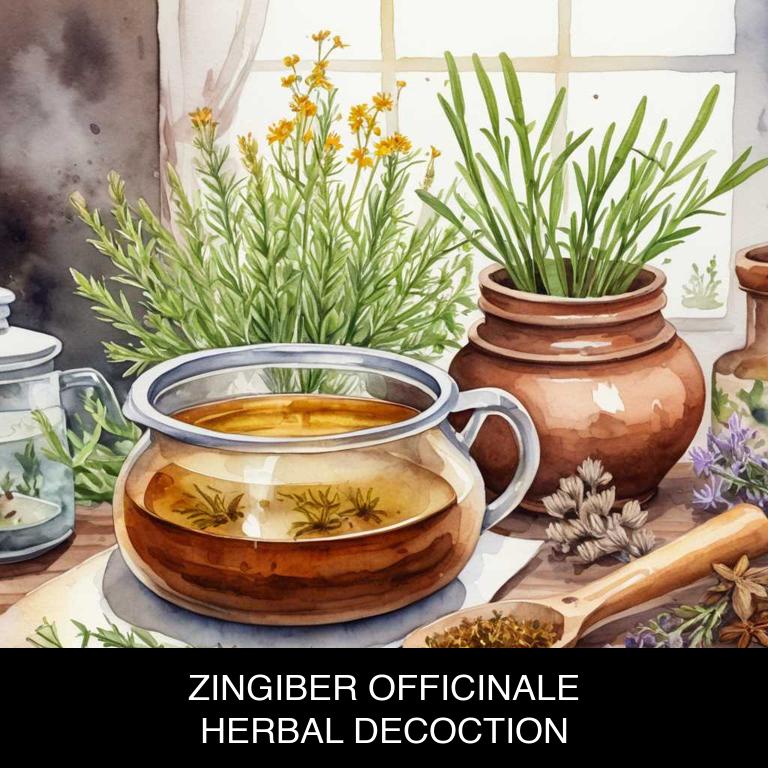
Medicinal Constituents
The list below shows the primary medicinal constituents in Zingiber officinale decoctions that help with ankylosing spondylitis.
- Gingerols: These gingerols, particularly 6-gingerol and 8-gingerol, have anti-inflammatory properties that help reduce joint inflammation and pain associated with ankylosing spondylitis.
- Shogaols: Shogaols, particularly 6-shogaol, have potent anti-inflammatory and antioxidant effects that help alleviate inflammation and oxidative stress in ankylosing spondylitis patients.
- Curcumenol: This sesquiterpene has anti-inflammatory and immunomodulatory properties that help regulate the immune system and reduce inflammation in ankylosing spondylitis, thereby alleviating symptoms such as pain and stiffness.
Parts Used
The list below shows the primary parts of ginger used to make decoctions for ankylosing spondylitis.
- Rhyzomes: The rhyzomes are used due to their high gingerol content, which has anti-inflammatory properties that help alleviate symptoms of ankylosing spondylitis.
- Roots: The roots are used for their ability to reduce pain and inflammation, making them a beneficial component in decoctions for ankylosing spondylitis.
- Barks: The barks are used for their antioxidant properties, which help in reducing oxidative stress and inflammation associated with ankylosing spondylitis.
Quick Recipe
The following recipe gives a procedure to make a basic ginger for ankylosing spondylitis.
- Measure 2-3 grams of dried zingiber officinale root and add to a small saucepan.
- Combine the measured root with 250 milliliters of water and place the saucepan on medium heat.
- Bring the water to a boil and then reduce the heat to a simmer for 5-7 minutes.
- Strain the decoction through a fine-mesh sieve into a cup or glass container.
- Allow the decoction to cool to room temperature before serving or storing in the refrigerator.
3. Salix alba
White willow decoctions helps with ankylosing spondylitis because it contains salicin, a natural anti-inflammatory compound that targets the underlying inflammation in the joints and spine.
By reducing pain and inflammation, herbal white willow decoctions can help alleviate symptoms of ankylosing spondylitis, such as morning stiffness, joint swelling, and reduced mobility.
Additionally, salicin also has analgesic properties, providing relief from chronic back pain and discomfort associated with this condition.
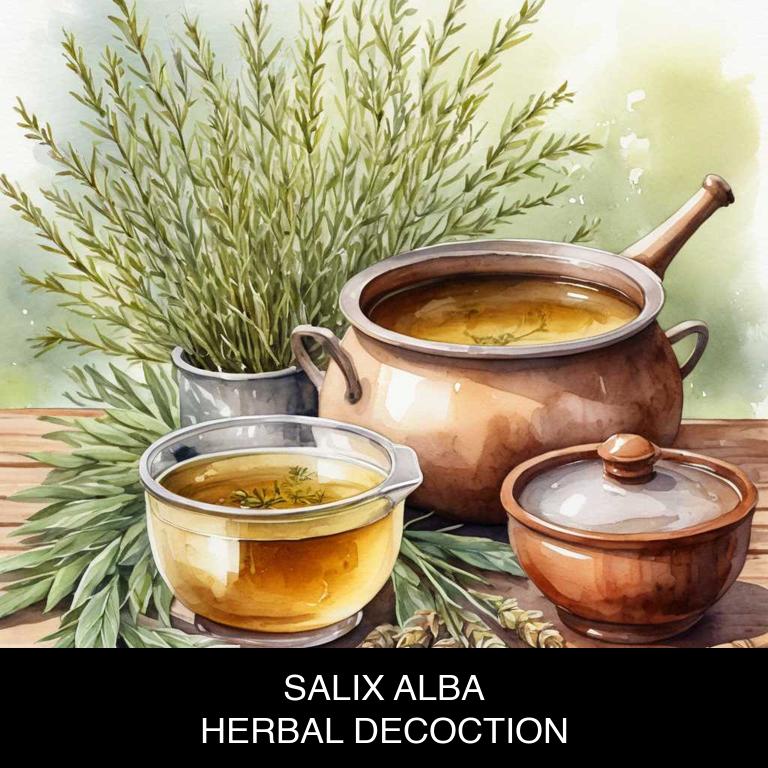
Medicinal Constituents
The list below shows the primary medicinal constituents in Salix alba decoctions that help with ankylosing spondylitis.
- Salicin: This salicylic acid derivative has anti-inflammatory and pain-relieving properties, which can help alleviate the chronic pain and inflammation associated with ankylosing spondylitis.
- Triterpenoids: These compounds, particularly salicilin and salicin, have been found to have anti-inflammatory and antioxidant properties, which can help reduce inflammation and oxidative stress in the body, contributing to the progression of ankylosing spondylitis.
- Flavonoids: Specifically, quercetin, a flavonoid present in Salix alba, has anti-inflammatory and antioxidant properties, which can help reduce inflammation and oxidative stress, as well as modulate the immune response, all of which are beneficial in managing ankylosing spondylitis.
Parts Used
The list below shows the primary parts of white willow used to make decoctions for ankylosing spondylitis.
- Barks: The barks are used due to their anti-inflammatory and pain-relieving properties.
- Leaves: The leaves are used because they contain salicylic acid, which helps reduce inflammation and relieve pain.
- Stems: The stems are used for their analgesic and anti-inflammatory properties, which help alleviate symptoms of ankylosing spondylitis.
Quick Recipe
The following recipe gives a procedure to make a basic white willow for ankylosing spondylitis.
- Harvest 50 grams of salix alba bark by cutting the branches during the spring season.
- Clean the harvested salix alba bark by gently removing any dirt or debris from the surface.
- Combine 50 grams of salix alba bark with 1 liter of water in a saucepan and bring to a boil.
- Reduce the heat to a simmer and allow the mixture to steep for 10 to 30 minutes.
- Strain the decoction and discard the solids by using cheesecloth or a fine-mesh sieve to separate the liquid.
4. Hypericum perforatum
St John's wort decoctions helps with ankylosing spondylitis because it possesses anti-inflammatory and immunomodulatory properties that help alleviate symptoms of this chronic condition.
The decoction has been shown to reduce inflammation in the joints, thereby decreasing pain and stiffness associated with ankylosing spondylitis. Additionally, St John's wort may help regulate the immune system, which is thought to play a role in the development of this autoimmune disorder.
By reducing inflammation and modulating the immune response, St John's wort decoctions can provide relief from symptoms and improve overall quality of life for individuals with ankylosing spondylitis.
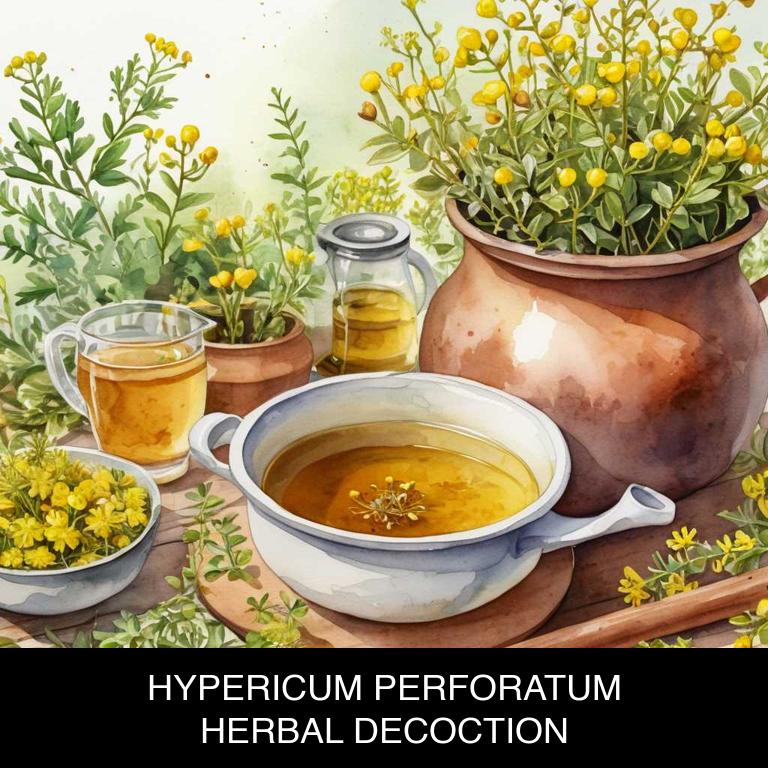
Medicinal Constituents
The list below shows the primary medicinal constituents in Hypericum perforatum decoctions that help with ankylosing spondylitis.
- Naphthodianthrones: These compounds, particularly hyperforin and hypericin, have potent anti-inflammatory properties, which can help reduce inflammation and pain associated with ankylosing spondylitis.
- Flavonoids: Specifically, quercetin, a flavonoid present in Hypericum perforatum, has been shown to have anti-inflammatory and antioxidant effects, which can help alleviate symptoms of ankylosing spondylitis, such as joint pain and stiffness.
- Phenolic acids: These compounds, including caffeic acid and ferulic acid, have been found to possess anti-inflammatory and antioxidant activities, which can help mitigate the inflammation and oxidative stress associated with ankylosing spondylitis.
Parts Used
The list below shows the primary parts of st john's wort used to make decoctions for ankylosing spondylitis.
- Leaves: They are rich in hyperforin and hypericin, which have anti-inflammatory properties that help alleviate symptoms of ankylosing spondylitis.
- Flowers: The flowers contain flavonoids and phenolic acids, which have anti-inflammatory and antioxidant effects that can help reduce inflammation and pain associated with ankylosing spondylitis.
- Roots: The roots are a good source of hyperforin and hypericin, which have been shown to have analgesic and anti-inflammatory effects that can help manage the symptoms of ankylosing spondylitis.
Quick Recipe
The following recipe gives a procedure to make a basic st john's wort for ankylosing spondylitis.
- Harvest the fresh flowers of hypericum perforatum at their peak potency in the mid-summer season.
- Dry the freshly harvested flowers in a cool dark place for 7 to 10 days.
- Use 1 to 3 teaspoons of dried flowers for every 8 ounces of water in a decoction.
- Steep the dried flowers in boiling water for 10 to 15 minutes to release their medicinal properties.
- Strain the decoction and discard the solids to obtain a concentrated herbal remedy.
5. Boswellia serrata
Frankincense decoctions helps with ankylosing spondylitis because of its potent anti-inflammatory properties, which reduce joint inflammation and stiffness.
The Boswellia serrata resin in frankincense has been shown to inhibit the production of inflammatory chemicals, thereby alleviating symptoms such as back pain, morning stiffness, and limited mobility.
Additionally, frankincense's ability to stimulate blood flow and oxygenation helps to nourish joints, promoting healing and reducing the risk of further damage.
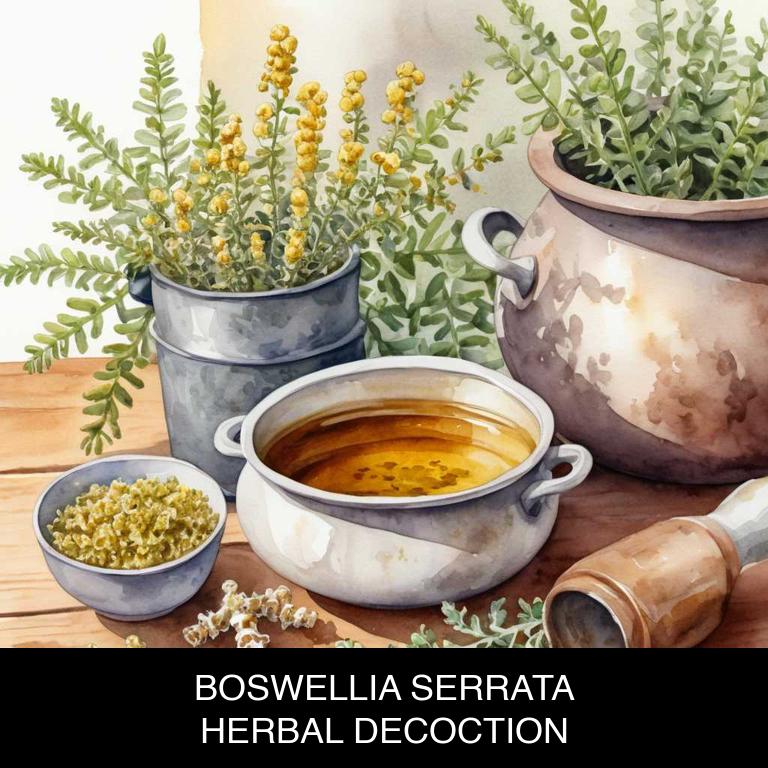
Medicinal Constituents
The list below shows the primary medicinal constituents in Boswellia serrata decoctions that help with ankylosing spondylitis.
- Accumulated boswellic acids: These compounds have potent anti-inflammatory properties, which help reduce inflammation and pain associated with ankylosing spondylitis by inhibiting the production of pro-inflammatory enzymes.
- 3-o-acetyl-11-keto-β-boswellic acid: AKBA is a major component of boswellic acids and has been shown to inhibit the production of pro-inflammatory cytokines, which play a key role in the development of ankylosing spondylitis.
- Α-boswellic acid: This terpene has been found to have potent anti-inflammatory and immunomodulatory effects, which help reduce inflammation and modulate the immune response in patients with ankylosing spondylitis, thereby alleviating symptoms.
Parts Used
The list below shows the primary parts of frankincense used to make decoctions for ankylosing spondylitis.
- Roots: They contain high concentrations of boswellic acids, which have anti-inflammatory properties that help alleviate the symptoms of ankylosing spondylitis.
- Rhyzomes: The rhyzomes of Boswellia serrata also contain boswellic acids, which work to reduce inflammation and pain in individuals with ankylosing spondylitis.
- Barks: The barks of Boswellia serrata contain boswellic acids and other bioactive compounds that contribute to their anti-inflammatory and analgesic effects in treating ankylosing spondylitis.
Quick Recipe
The following recipe gives a procedure to make a basic frankincense for ankylosing spondylitis.
- Measure out 2-4 grams of dried boswellia serrata resin powder and place it in a heat-resistant glass cup.
- Add 2 cups of pure water to the cup with the boswellia serrata powder and stir well to combine.
- Bring the water and boswellia serrata mixture to a gentle boil over low-medium heat for 5-10 minutes.
- Reduce the heat to a simmer and continue to cook for an additional 15-20 minutes or until the liquid has reduced slightly.
- Strain the decoction through a fine-mesh sieve or cheesecloth into a clean glass container and discard the solids.
6. Harpagophytum procumbens
Devil's claw decoctions helps with ankylosing spondylitis because it contains harpagosides, a unique compound that has potent anti-inflammatory and analgesic properties.
The decoction can help reduce inflammation in the joints and spine, alleviating pain and stiffness associated with the condition. Additionally, devil's claw may also help to improve range of motion and flexibility, allowing individuals with ankylosing spondylitis to regain some mobility and independence.
By addressing the root causes of the disease, devil's claw decoctions can provide relief from chronic pain and discomfort.
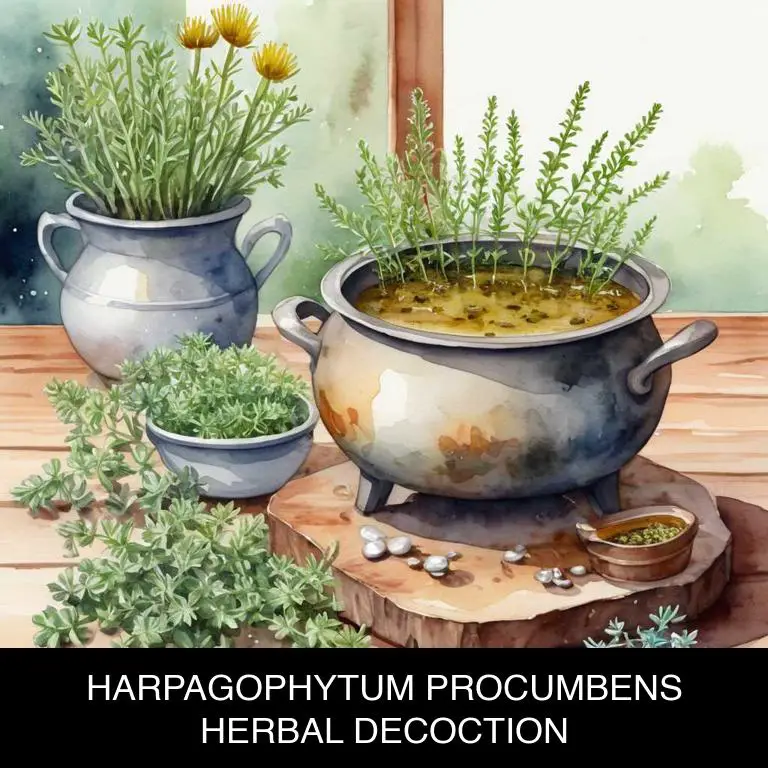
Medicinal Constituents
The list below shows the primary medicinal constituents in Harpagophytum procumbens decoctions that help with ankylosing spondylitis.
- Harpagide: Harpagide is a glycoside with anti-inflammatory properties, which helps reduce inflammation and pain associated with ankylosing spondylitis.
- Procumbine: Procumbine is an iridoid glycoside with potent anti-inflammatory and immunomodulatory effects, which helps alleviate symptoms of ankylosing spondylitis by suppressing pro-inflammatory cytokines and promoting anti-inflammatory responses.
- Dehydroharpagide: Dehydroharpagide is an iridoid glycoside with anti-inflammatory and antioxidant properties, which helps protect joints from oxidative damage and promotes the healing of inflamed tissues in ankylosing spondylitis.
Parts Used
The list below shows the primary parts of devil's claw used to make decoctions for ankylosing spondylitis.
- Roots: They are the primary component used for decoctions, as they contain the highest concentration of harpagoside, a key compound responsible for its anti-inflammatory effects.
- Stems: They are often included in decoctions due to their higher fiber content, which can help in soothing the digestive system and promoting overall well-being.
- Leaves: They are also used, although less frequently than roots and stems, as they contain some of the plant's active compounds, contributing to its therapeutic benefits.
Quick Recipe
The following recipe gives a procedure to make a basic devil's claw for ankylosing spondylitis.
- Harvest 50-100 grams of dried harpagophytum procumbens roots from a trusted supplier or cultivate your own.
- Rinse the dried roots in a fine mesh strainer under cold running water for about 1 minute.
- Combine the rinsed harpagophytum procumbens roots with 500 milliliters of cold water in a saucepan.
- Bring the mixture to a boil over high heat then reduce the heat to a simmer for 10-15 minutes.
- Strain the decoction through a fine mesh strainer into a separate container discard the solids.
7. Withania somnifera
Ashwagandha decoctions helps with ankylosing spondylitis because it addresses the underlying inflammation and stress that exacerbates the condition.
The herbal extract contains bioactive compounds like withanolides, which have potent anti-inflammatory properties, reducing joint pain and stiffness. Additionally, ashwagandha's adaptogenic effects help manage stress, a known trigger for ankylosing spondylitis flares.
By calming the mind and body, ashwagandha decoctions may also improve sleep quality, which is often disrupted in people with ankylosing spondylitis.
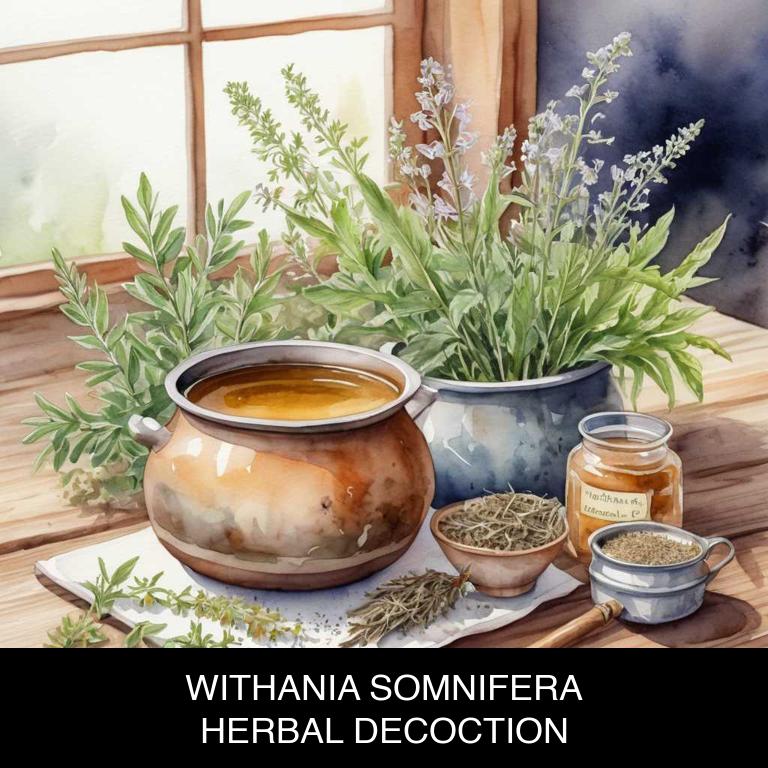
Medicinal Constituents
The list below shows the primary medicinal constituents in Withania somnifera decoctions that help with ankylosing spondylitis.
- Withanolides: These steroidal lactones have anti-inflammatory and immunomodulatory properties, which can help reduce joint inflammation and pain associated with ankylosing spondylitis.
- Withaferin a: This alkaloid has potent anti-inflammatory and antioxidant activities, which can help alleviate the oxidative stress and inflammation that contribute to the progression of ankylosing spondylitis.
- Withanoside iv: This saponin has anti-inflammatory and immunomodulatory effects, which can help regulate the immune response and reduce the severity of symptoms associated with ankylosing spondylitis.
Parts Used
The list below shows the primary parts of ashwagandha used to make decoctions for ankylosing spondylitis.
- Roots: The roots are used due to their high concentration of bioactive compounds, including alkaloids, glycosides, and saponins, which exhibit anti-inflammatory and immunomodulatory properties.
- Leaves: The leaves are used for their rich content of withanolides, which have been shown to reduce inflammation and alleviate symptoms associated with ankylosing spondylitis.
- Seeds: The seeds are used due to their high content of withanolides and other bioactive compounds, which have been found to possess anti-inflammatory and antioxidant properties, useful in managing ankylosing spondylitis.
Quick Recipe
The following recipe gives a procedure to make a basic ashwagandha for ankylosing spondylitis.
- Weigh 2-4 grams of dried root powder for a single dose of the herbal decoction.
- Combine the root powder with 250-500 ml of boiling water in a heat-resistant container.
- Reduce heat and let the decoction simmer for 10-30 minutes or until it reaches desired strength.
- Strain the liquid using a cheesecloth or a fine-mesh sieve to remove the root particles.
- Allow the decoction to cool before consuming it as a liquid or mixing it with other substances.
8. Cinnamomum verum
Ceylon cinnamon decoctions helps with ankylosing spondylitis because it possesses anti-inflammatory properties that effectively reduce inflammation and pain in the joints.
The decoction's natural antioxidants also help to improve circulation, which can aid in the reduction of stiffness and joint rigidity often associated with ankylosing spondylitis.
Additionally, Ceylon cinnamon's immunomodulatory effects may help to regulate the immune system's response, further alleviating symptoms such as fatigue and morning stiffness.
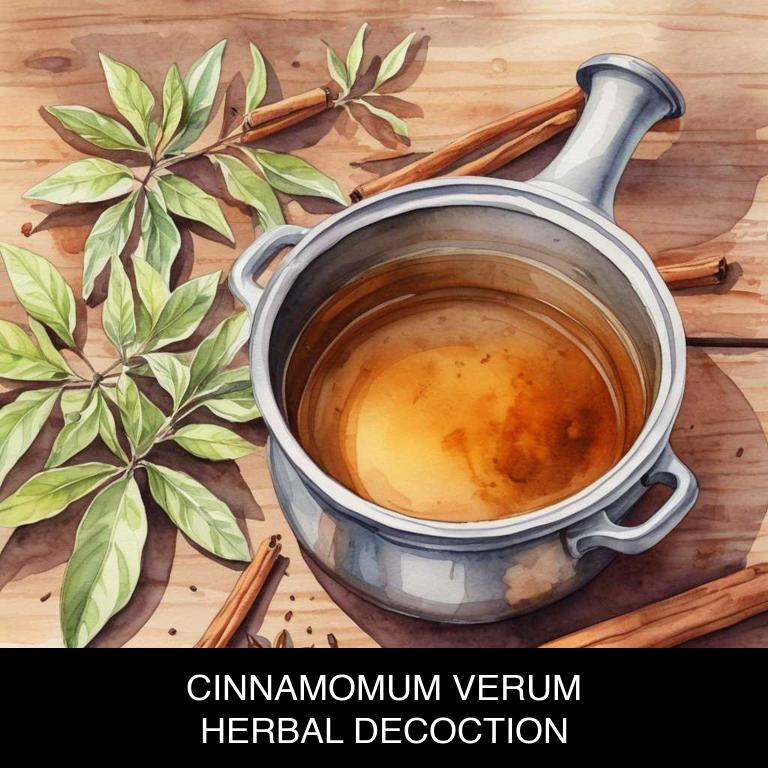
Medicinal Constituents
The list below shows the primary medicinal constituents in Cinnamomum verum decoctions that help with ankylosing spondylitis.
- Eugenol: Eugenol is a phenolic compound that has anti-inflammatory properties, which can help reduce inflammation and pain associated with ankylosing spondylitis.
- Cinnamaldehyde: Cinnamaldehyde is an aromatic compound that has anti-inflammatory and antioxidant properties, which can help alleviate joint inflammation and oxidative stress in ankylosing spondylitis patients.
- Linalool: Linalool is a terpene that has anti-inflammatory and immunomodulatory effects, which can help regulate the immune response and reduce inflammation in the joints of ankylosing spondylitis patients.
Parts Used
The list below shows the primary parts of ceylon cinnamon used to make decoctions for ankylosing spondylitis.
- Barks: The barks are commonly used due to their anti-inflammatory properties, which help in reducing joint pain and inflammation associated with ankylosing spondylitis.
- Leaves: Cinnamon leaves are used in decoctions for their analgesic and anti-inflammatory properties, which provide relief from joint pain and stiffness in ankylosing spondylitis.
- Rhyzomes: The rhizomes of Cinnamomum verum are used in traditional medicine for their anti-inflammatory and immunomodulatory effects, helping to reduce inflammation and alleviate symptoms of ankylosing spondylitis.
Quick Recipe
The following recipe gives a procedure to make a basic ceylon cinnamon for ankylosing spondylitis.
- Harvest 10-15 grams of dried cinnamomum verum bark from a reputable source to ensure quality and purity.
- Grind the cinnamomum verum bark into a fine powder using a mortar and pestle for optimal extraction.
- Combine the cinnamomum verum powder with 500 ml of boiling water in a heat-resistant container to create the decoction.
- Steep the mixture for 5-7 minutes, allowing the active compounds to infuse into the water effectively.
- Strain the decoction through a cheesecloth or fine-mesh sieve into a clean container, discarding the solids completely.
9. Echinacea angustifolia
Kansas coneflower decoctions helps with ankylosing spondylitis because of its anti-inflammatory and antioxidant properties.
The decoction, rich in bioactive compounds such as caffeic acid and rosmarinic acid, targets the underlying inflammation in the body that contributes to joint pain and stiffness.
By reducing inflammation and oxidative stress, Kansas coneflower decoctions may help alleviate symptoms of ankylosing spondylitis, including reduced morning stiffness, improved mobility, and decreased pain and discomfort.
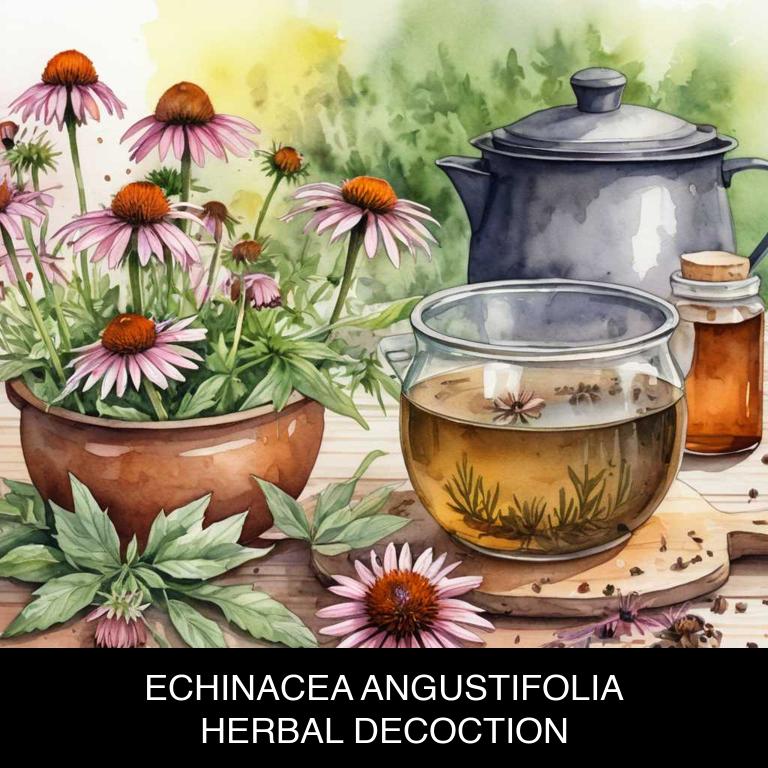
Medicinal Constituents
The list below shows the primary medicinal constituents in Echinacea angustifolia decoctions that help with ankylosing spondylitis.
- Iridoid glycosides: These compounds have anti-inflammatory properties, which can help reduce inflammation and pain associated with ankylosing spondylitis.
- Alkaloids: These constituents have been shown to have immunomodulatory effects, which can help regulate the immune system's response and reduce inflammation in the body.
- Phenylethanoid glycosides: These compounds have been found to have antioxidant properties, which can help protect against oxidative stress and inflammation in the body, potentially alleviating symptoms of ankylosing spondylitis.
Parts Used
The list below shows the primary parts of kansas coneflower used to make decoctions for ankylosing spondylitis.
- Roots: They are rich in iridoid glycosides, which have anti-inflammatory properties that help alleviate the symptoms of ankylosing spondylitis.
- Leaves: They contain flavonoids and phenolic acids that exhibit anti-inflammatory and antioxidant effects, which may help reduce inflammation and pain associated with the condition.
- Roots: The roots of Echinacea angustifolia are also known to contain alkaloids, which may help reduce inflammation and improve immune function in individuals with ankylosing spondylitis.
Quick Recipe
The following recipe gives a procedure to make a basic kansas coneflower for ankylosing spondylitis.
- Harvest echinacea angustifolia roots in the fall after the first frost when the roots are fully mature.
- Dry the roots at 30-40°c for 24-48 hours to preserve their potency and prevent spoilage.
- Grind 20-30 grams of dried echinacea angustifolia roots into a fine powder using a mortar and pestle.
- Combine the ground roots with 500 milliliters of boiling water in a saucepan and reduce heat to simmer for 10-15 minutes.
- Strain the decoction through a cheesecloth or fine-mesh sieve into a clean container and discard the solids.
10. Mentha x piperita
Peppermint decoctions helps with ankylosing spondylitis because its natural anti-inflammatory compounds, such as menthol and methanol, have been shown to effectively reduce inflammation in the joints.
The decoction's analgesic properties also help alleviate chronic pain associated with this condition. Additionally, peppermint's digestive benefits can soothe gastrointestinal issues often linked to ankylosing spondylitis.
By reducing joint stiffness and pain, improving digestion, and calming inflammation, herbal peppermint decoctions can provide significant relief for those suffering from this debilitating autoimmune disorder.
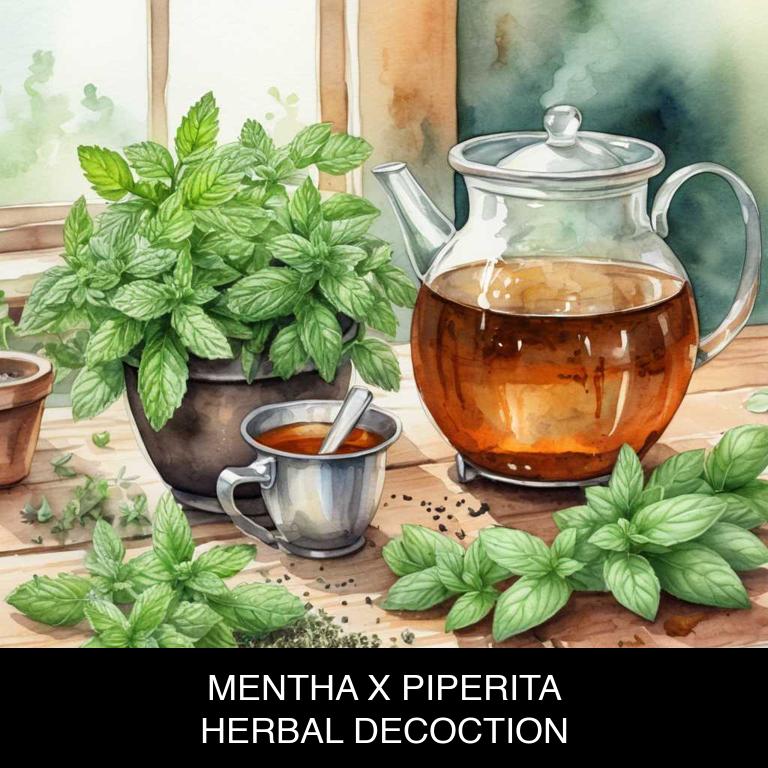
Medicinal Constituents
The list below shows the primary medicinal constituents in Mentha x piperita decoctions that help with ankylosing spondylitis.
- Rosmarinic acid: A phenolic compound that exhibits potent anti-inflammatory and antioxidant properties, helping to reduce inflammation and oxidative stress associated with ankylosing spondylitis.
- Menthol: A terpene that has analgesic and anti-inflammatory effects, providing relief from pain and discomfort associated with ankylosing spondylitis.
- Caryophyllene oxide: A sesquiterpene that has anti-inflammatory and immunomodulatory effects, helping to reduce inflammation and modulate the immune response in ankylosing spondylitis.
Parts Used
The list below shows the primary parts of peppermint used to make decoctions for ankylosing spondylitis.
- Leaves: They are used because of their high concentration of menthol and other bioactive compounds with anti-inflammatory properties.
- Roots: They contain a higher concentration of menthone and menthyl acetate, which contribute to their anti-inflammatory and pain-relieving effects.
- Stems: They are also used because they contain a mix of bioactive compounds, including menthol and menthone, which help reduce inflammation and relieve pain.
Quick Recipe
The following recipe gives a procedure to make a basic peppermint for ankylosing spondylitis.
- Harvest fresh mentha x piperita leaves and flowers from a clean organic source in the morning.
- Chop 20-30 grams of fresh mentha x piperita leaves and flowers into small pieces for decoction.
- Combine chopped plant material with 1 liter of water in a saucepan and bring to a boil.
- Reduce heat to a simmer and let the mixture steep for 10-15 minutes to extract active compounds.
- Strain the decoction through a cheesecloth or fine-mesh sieve into a clean container and discard solids.
What is the best combination of herbal decoctions to use for ankylosing spondylitis?
The best combination of herbal decoctions that help with ankylosing spondylitis is a blend of turmeric, ginger, and ashwagandha.
Turmeric contains curcumin, a potent anti-inflammatory that reduces joint pain and inflammation. Ginger adds warmth and anti-inflammatory properties, while ashwagandha helps to reduce stress and promote relaxation. Combining these herbs in a decoction can help alleviate symptoms of ankylosing spondylitis, such as joint pain, stiffness, and limited mobility.
This natural remedy can be consumed 2-3 times a day to promote overall well-being and reduce symptoms.
What ailments similar to ankylosing spondylitis are treated with herbal decoctions?
Ailments similar to ankylosing spondylitis that are treated with herbal decoctions are various forms of arthritis and joint pain.
Herbal remedies such as turmeric, ginger, and ashwagandha have anti-inflammatory properties that help alleviate symptoms like stiffness, swelling, and pain.
Decoctions made from these herbs may also be used to treat other conditions like gout, rheumatoid arthritis, and fibromyalgia.